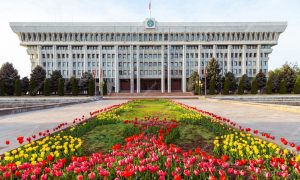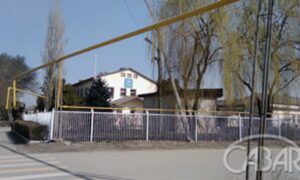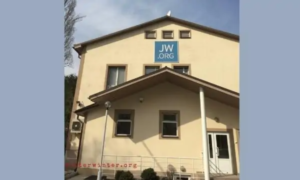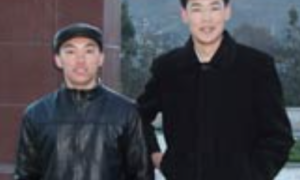On 2 December, a Bishkek court rejected a General Prosecutor’s Office suit to ban Jehovah’s Witness books and videos as “extremist”, saying it had been filed under the wrong procedure. The General Prosecutor’s Office official who took the case to court said it will not appeal. “The repression is postponed for now,” said Syinat Sultanalieva of Human Rights Watch. The NSC secret police – which backed the ban attempt – is also pushing to have Jehovah’s Witnesses banned. The General Prosecutor’s Office official said he is not aware of any suit being prepared. The NSC officer investigating a 2-year-old criminal case against unspecified Jehovah’s Witnesses refused to give information, citing the “secrecy of the investigation”.
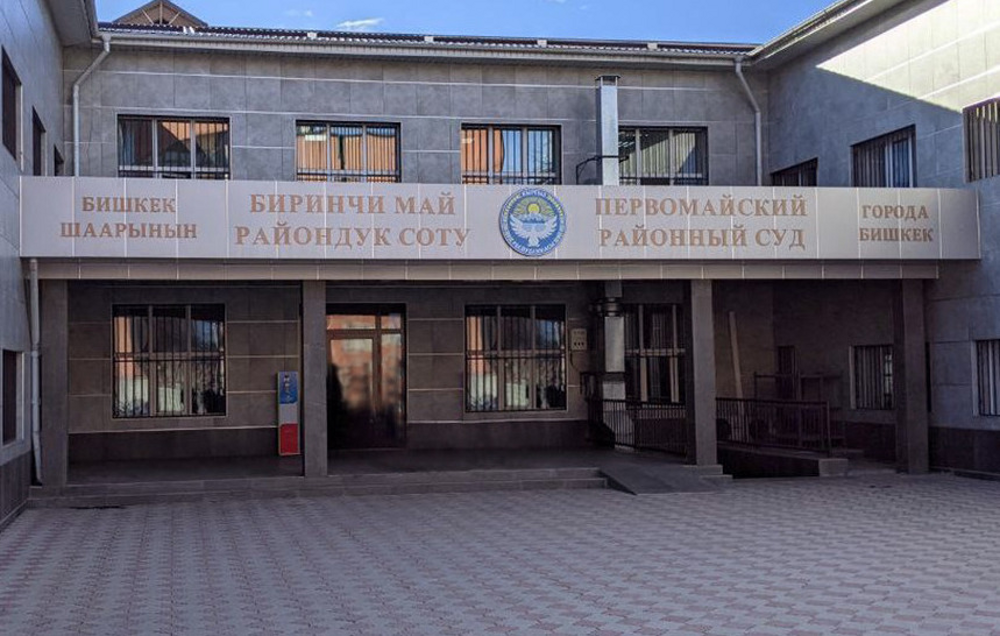
On 2 December, a Bishkek court ruled that a suit from the General Prosecutor’s Office to ban 13 Jehovah’s Witness publications and 6 videos as “extremist” had not been filed correctly and dismissed the case. Syinat Sultanalieva of Human Rights Watch, who was present at the court, tweeted immediately after the hearing: “The repression is postponed for now, more [international] monitoring needed!”
The official of the General Prosecutor’s Office who took the case to court told Forum 18 it respects this decision and will not appeal against it. He said it is for the National Security Committee (NSC) secret police or the Interior Ministry to decide if they wish to prepare material for a new suit to try to have the books and videos banned.
In her 22-page decision, seen by Forum 18, Judge Venera Aydaraliyeva of Bishkek’s Pervomaisky District Court ruled that because the question of whether the books and videos are “extremist” is contested, the General Prosecutor’s Office should have lodged a suit against Jehovah’s Witnesses directly, rather than through a simple motion to have the materials declared “extremist”.
The NSC secret police – which was behind the attempt to ban the books and videos – has also been pushing to have Jehovah’s Witnesses banned in Kyrgyzstan. The General Prosecutor’s Office official told Forum 18 he has not heard that any suit for such a ban is being prepared.
The NSC secret police continues to investigate a criminal case opened in December 2019 against so far unspecified representatives of the Jehovah’s Witness national centre in Bishkek on charges of inciting hatred. The NSC officer investigating the case, Lieutenant Kubanychbek Toktaliyev, refused to give Forum 18 any information about the case on 17 December, citing the “secrecy of the investigation” .
“We believe that the General Prosecutor’s Office initiated the civil case to declare some publications ‘extremist’ primarily to strengthen the criminal investigation and pave the way for an eventual claim to liquidate the national centre and ban the peaceful worship of Jehovah’s Witnesses in Kyrgyzstan,” Jehovah’s Witnesses told Forum 18 in November.
A ban on a religious community would be against Kyrgyzstan’s legally-binding international human rights obligations. The country acceded to the International Covenant on Civil and Political Rights (ICCPR) in 1994, and ICCPR Article 19 (“Freedoms of opinion and expression”) states: “Everyone shall have the right to freedom of expression; this right shall include freedom to seek, receive and impart information and ideas of all kinds, regardless of frontiers, either orally, in writing or in print, in the form of art, or through any other media of his [sic] choice”. As General Comment 34 on this Article puts it: “All forms of opinion are protected, including opinions of a (..) moral or religious nature. It is incompatible with paragraph 1 to criminalize the holding of an opinion. The harassment, intimidation or stigmatization of a person, including arrest, detention, trial or imprisonment for reasons of the opinions they may hold, constitutes a violation of article 19”.
The General Prosecutor’s Office gave Jehovah’s Witnesses only a few days’ notice of the hearing to ban its books and videos, with access to the full documents only at the first hearing .
The 16-page General Prosecutor’s Office suit – seen by Forum 18 – quotes word for word a claim by the Head of the NSC secret police Kamchybek Tashiyev that Jehovah’s Witness teaching “is contradictory and oriented towards people who don’t know the fundamentals of religion and the Bible” and that it is based on “the personal views of the founders of the organisation who misinterpret the Bible” .
In July, the Head of the NSC secret police Tashiyev wrote to the General Prosecutor calling for not only Jehovah’s Witness literature to be banned, but the community as a whole. He claimed, without giving evidence, that Jehovah’s Witnesses “at various times and in various countries have been accused of rape, child kidnapping, murder, incitement to murder and suicide, desertion, fraud, theft, racism, extortion, bodily harm, prostitution, etc. The activity of Jehovah’s Witnesses is banned in Russia, China, Turkmenistan, Tajikistan, Iran, Iraq and in a number of other countries”.
Gulnaz Isayeva, a Deputy Director of the State Commission for Religious Affairs (SCRA), distanced her agency from the General Prosecutor’s Office and NSC secret police allegations. “We would have to study their arguments to see if there is a basis for this,” she told Forum 18 in November. “If they [Jehovah’s Witnesses] were extremist, we wouldn’t have registered them.”
Jehovah’s Witnesses’ struggles to gain state registration for many of their communities – especially in the south – have been accompanied by false allegations against Jehovah’s Witnesses, the use of torture against Jehovah’s Witnesses, and NSC secret police and ordinary police officers repeatedly trying to stop defence lawyers participating in the appeal hearing, and invading a judges’ deliberation room.
In December the United Nations Human Rights Committee issued its second finding that Kyrgyzstan had violated the rights of Jehovah’s Witnesses by refusing to register their communities.
The authorities refuse to allow the Ahmadi Muslim community to function. The Falun Gong spiritual movement was banned as “extremist”, was later able to register as a public organisation but two months later the Justice Ministry cancelled the registration. The authorities have also banned as “extremist” the film “I am Gay and Muslim”.
The State Commission for Religious Affairs made public in December a draft new Religion Law, as well as an Amending Law which would bring new punishments in the Violations Code for the exercise of freedom of religion or belief.
The draft new Religion Law would – if eventually adopted in its current form – make it more difficult to exercise freedom of religion or belief. Among new restrictions, registering small religious communities would be more difficult or impossible, and the draft might also make it impossible to register communities that do not own their own buildings.
The draft Law would continue to require 200 adults to found a religious community and apply for compulsory registration, but would now require them to live in one Region of the country. All 200 would be required to attend the founding meeting in person and have their full personal details recorded and notarised. “It is physically impossible to gather more than 200 people at one notary’s office to certify the list of founders with a record of the passport details of these citizens, as well as the record of the founding meeting on one day,” Bishkek lawyer Zhanara Askar kyzy insists. She also warned that such notarisation would be expensive.
The draft Religion Law would also continue the current ban on meetings for worship and religious education without state permission.
Another of the provisions violating human rights is that, for the first time, the draft Law would require individuals or religious communities to gain registration from the SCRA for places of worship that they use, whether owned or rented.
On 13 December, the Justice Ministry’s website of draft laws open for public discussion published the texts of the draft Religion Law and draft Amending Law in Kyrgyz or Russian. It gives 12 January 2022 as the end of the consultation period and 19 January 2022 as the end of the “consideration” period.
The Cabinet of Ministers website also published the draft texts the following day, inviting comments to be sent to the private email address of Manas Muratbekov, head of the SCRA’s Legal Department who prepared the drafts.
General Prosecutor’s Office claims
The General Prosecutor’s Office prepared a 16-page suit – seen by Forum 18 – asking Bishkek’s Pervomaisky District Court to ban 13 Jehovah’s Witness books (3 in Kyrgyz and 10 in Russian) and 6 videos as “extremist”. It asked the court to assign enforcement of the ban to the NSC secret police, the ordinary police, the State Commission for Religious Affairs and the Communications Regulation and Oversight Service.
The suit noted that it drew on claims from the NSC secret police. The suit – quoting word for word a claim by the Head of the NSC secret police Kamchybek Tashiyev – claimed that Jehovah’s Witness teaching “is contradictory and oriented towards people who don’t know the fundamentals of religion and the Bible” and that it is based on “the personal views of the founders of the organisation who misinterpret the Bible”.
The General Prosecutor’s Office suit pointed to the criminal case opened against so far unspecified representatives of the Jehovah’s Witness national centre in December 2019 and the March 2021 NSC secret police raid on the centre. It also cited four “expert analyses” conducted by the Justice Ministry’s Judicial Expert Analysis Centre, two on 30 December 2019 (one of 3 pages, the other of 5 pages), one on 8 April 2020 (of 17 pages) and the fourth on 6 May 2021 (of 33 pages).
An official of the Justice Ministry’s Judicial Expert Analysis Centre, who did not give her name, told Forum 18 in November that it could not give Forum 18 copies of the “expert analyses” it prepared on the Jehovah’s Witness materials.
Such “expert analyses” have long been used against the exercise of freedom of religion and belief, and have been strongly criticised by lawyers, human rights defenders, and members of religious communities.
The “analyses” claimed that the books contain “negative attitudes” to other faiths, express the superiority and uniqueness of the faith of Jehovah’s Witnesses, and “call in hidden form not to obey laws and the norms of a secular state”. It said they “incite religious enmity (discord)”.
The General Prosecutor’s Office suit, citing the “experts”, also included a list copied from a Russian blog of 63 things Jehovah’s Witnesses are supposedly unable to do. These include laughing at obscene jokes, getting fat, attending rock concerts and throwing rice at weddings. The suit attributed the list – without any explanation – to “Doctor Bergman”.
Russian websites – including those of Aleksandr Dvorkin and that of the Russian Orthodox Church in Belarus – identify the widely-copied list as a translation from the 1992 book “Jehovah’s Witnesses and the Problems of Mental Illness” by an American writer Jerry Bergman, a prolific writer against Jehovah’s Witnesses.
Book and video-banning suit reaches court
On 17 November, Deputy General Prosecutor Kumarbek Toktakunov sent the suit to Bishkek’s Pervomaisky District Court asking for it to ban 13 Jehovah’s Witness books (3 in Kyrgyz and 10 in Russian) and 6 videos as “extremist”. The Court assigned the case to Judge Venera Aydaraliyeva.
Jehovah’s Witnesses told Forum 18 that they only learnt of the General Prosecutor’s Office suit on 23 November. This allowed them little time to prepare for the hearings. Only at 4 pm on 26 November did officials tell them that the first hearing would be on 29 November. Jehovah’s Witness representatives asked for an adjournment to allow them to study the documentation which was only made available to them at the brief hearing.
Azatbek Temirbayev represented the General Prosecutor’s Office. “Interested parties” in the case were the NSC secret police (represented by O. Baigazakov), the Interior Ministry (represented by M. Amanbayev) and the State Commission for Religious Affairs (represented by Aybek Iminov and A. Kurbanaliyev).
Gulnaz Isayeva, Deputy Director of the State Commission for Religious Affairs, told Forum 18 in November that its lawyers were participating in the case after receiving notice from the court. Iminov refused to comment to Forum 18 on 7 December about his involvement in the case and whether the SCRA considers the Jehovah’s Witness books and videos “extremist”.
Jehovah’s Witnesses filed several submissions to the court objecting to the proceedings. One from the Watch Tower Bible and Tract Society of Pennsylvania, the publisher of the books, called for the suit to be rejected, describing it as “grossly discriminatory and biased”.
Case dismissed
The banning case resumed at Pervomaisky District Court on the morning of 2 December, but the hearing was short and no oral arguments were heard. Judge Aydaraliyeva told participants that in view of the submissions objecting to the suit she would withdraw to the deliberation room to consider them, Jehovah’s Witnesses told Forum 18.
The Judge came back to the court room after 40 minutes and issued her decision orally that she was leaving the suit “without consideration”. She noted that the suit had been filed under the procedure where there is no dispute about the facts. She said the objections made clear that the facts were in dispute and the matter could only be considered in a regular civil case with proper notice and all the rights to a fair hearing.
Syinat Sultanalieva of Human Rights Watch was present at the court. “short court hearing over: security services are to re-submit the case, court did not find grounds for the dispute as it is,” she tweeted on 2 December. “The repression is postponed for now, more [international] monitoring needed!”
Sultanalieva told Radio Free Europe’s Kyrgyz Service for a 4 December article that although the court dismissed the suit, she regarded the suit itself as a “very dangerous sign”. She insisted that the Jehovah’s Witness publications are not dangerous and expressed surprise at the NSC secret police and ordinary police involvement in seeking to ban them.
22-page decision
Judge Aydaraliyeva set out her reasoning in full in her 22-page written decision, seen by Forum 18. Azatbek Temirbayev of the General Prosecutor’s Office told Forum 18 that it received the written decision on 7 December. Jehovah’s Witnesses received the written decision on 10 December.
The decision replicates the General Prosecutor’s Office’s arguments almost verbatim. This includes the NSC secret police claims that Jehovah’s Witness teaching “is contradictory and oriented towards people who don’t know the fundamentals of religion and the Bible” and that it is based on “the personal views of the founders of the organisation who misinterpret the Bible”.
The decision then incorporates almost verbatim the objections from Jehovah’s Witnesses. These note that the “expert analyses” had been commissioned as part of the separate NSC secret police criminal case and which therefore should not be admissible in the banning case. They point out that the “expert analyses” had been conducted in violation of legal norms. As 80 to 90 percent of their substantive content was plagiarised from Russian “expert analyses” and four Russian-language articles found on the internet, they were not “founded in scholarship”. They note that the “experts” made claims about numerous publications but provided analysis of only a few (the May 2021 analysis made comments only on 9 out of 53 texts the “expert” claimed to find “extremist”). Jehovah’s Witnesses complained that the “experts” were not presented in court to be questioned.
The decision includes the Jehovah’s Witnesses contention that the General Prosecutor’s Office suit was part of a “planned campaign against 5,000 citizens of Kyrgyzstan who profess the religion of Jehovah’s Witnesses”.
Without commenting on the General Prosecutor’s Office assertions or the Jehovah’s Witness objections, Judge Aydaraliyeva concluded that the suit should be left “without consideration” as it had been filed under the wrong procedure. She noted that the suit had been filed under the procedure where there is no dispute about the facts. She said the objections made clear that the facts were in dispute and the matter could only be considered in a regular civil case with proper notice and all the rights to a fair hearing.
The decision gave the General Prosecutor’s Office ten days to appeal to Bishkek City Court.
No appeal against case dismissal, but will new suit be filed?
The General Prosecutor’s Office accepts the 2 December court decision as founded in law and will not challenge it, Azatbek Temirbayev told Forum 18 from Bishkek on 17 December.
Asked if the General Prosecutor’s Office will file a new suit to court to try to ban the Jehovah’s Witness books and videos, Temirbayev responded that it is for the NSC secret police or the Interior Ministry to decide if they wish to prepare material for a new suit.
Secret police banning request
On 29 July 2021, Kamchybek Tashiyev, the head of the NSC secret police, sent a letter to the General Prosecutor Kurmankul Zulushev (seen by Forum 18) making various allegations against Jehovah’s Witnesses.
Tashiyev claimed, without giving evidence, that Jehovah’s Witnesses “at various times and in various countries have been accused of rape, child kidnapping, murder, incitement to murder and suicide, desertion, fraud, theft, racism, extortion, bodily harm, prostitution, etc. The activity of Jehovah’s Witnesses is banned in Russia, China, Turkmenistan, Tajikistan, Iran, Iraq and in a number of other countries.”
Noting the “expert analyses” of Jehovah’s Witness materials undertaken as part of the criminal case, Tashiyev insisted that these publications incite “religious hatred (discord) and propaganda of exclusivity, superiority or inferiority of citizens on the basis of their religious views”, a “hostile attitude” towards people of other faiths, and calls for individuals to refuse to perform civic duties prescribed by law.
Tashiyev also claimed that “according to doctors, negative psychological changes may be caused by being a member of this organisation”. He cited a complaint by a mother that her 41-year-old daughter, allegedly a former Jehovah’s Witness, is “in constant need of medical care” after suffering “psychological harm” and “negative changes to her psychological state”. He then quotes two television programmes where alleged former Jehovah’s Witnesses spoke out.
Tashiyev asked the General Prosecutor “in order to forestall negative consequences from the illegal activity” of Jehovah’s Witnesses as well as “to prevent damage to national security” not only to ban items of their literature but to consider a ban on the entire organisation. He attached 142 pages of “non-secret” material.
In its submission to Pervomaisky District Court ahead of the 2 December literature banning hearing, Jehovah’s Witnesses described Tashiyev’s assertions as “biased and intolerant”, as well as “grossly offensive and discriminatory”. They pointed out that in making allegations or rape and other serious crimes, he “does not cite even one case, from anywhere in the world, where such an allegation had been established”.
The NSC secret police refused to put Forum 18 through to Tashiyev. “There’s no way you can talk to him,” the duty officer told Forum 18 in November. He referred Forum 18 to the spokesperson. However, the spokesperson – who did not give his name – refused to answer any questions by phone about Tashiyev’s letter to the General Prosecutor seeking the banning of Jehovah’s Witness literature and asking for a ban on the organisation to be considered, or about why the NSC is conducting a criminal case. He asked for questions in writing.
On 30 November, Forum 18 resent the questions it had already sent in writing on 26 November. Forum 18 received no reply by the end of the working day in Bishkek of 17 December.
Azatbek Temirbayev of the General Prosecutor’s Office told Forum 18 on 17 December that he is not aware of any suit being prepared to seek to ban Jehovah’s Witnesses in Kyrgyzstan.
“Secrecy of the investigation” in 2-year criminal case
On 4 December 2019, the NSC secret police opened a criminal case against so far unspecified members of the Jehovah’s Witness national centre in Bishkek under Article 313, Part 2, Point 2 of the Criminal Code then in force. This punishes “Incitement of racial, ethnic, national, religious or inter-regional enmity (discord) conducted by a group of people in a prior conspiracy” with jail terms.
Article 313 of the old Criminal Code is similar to Article 330 of the new Criminal Code which came into force on 1 December 2021. Any trial would take place under the provisions in force at the time the “crime” was committed.
No individual defendants are reportedly named as part of the criminal case. Jehovah’s Witnesses fear that any guilty verdict would have wider consequences. “A guilty verdict would likely lead to closing the centre, dissolving its activities, likely confiscating its assets, and subsequent prosecutions and imprisonment of anyone who was deemed to be continuing those activities,” they told Forum 18 in November.
Zhayilbek Dadiyev of the Presidential Administration confirmed to Forum 18 in November that the criminal case had been opened by the NSC secret police after an appeal from an individual.
As part of the criminal case, the NSC secret police raided the Jehovah’s Witness national centre in Bishkek and the adjoining residence on 25 March 2021. Officers seized documents and electronic equipment from both. “After protests they returned the confiscated materials within one day,” Jehovah’s Witnesses told Forum 18.
The General Prosecutor’s Office banning suit (see above) notes that the four “expert analyses” of Jehovah’s Witness publications and videos were commissioned as part of the criminal case.
The NSC officer investigating the criminal case, Lieutenant Kubanychbek Toktaliyev, refused to give Forum 18 any information about the case on 17 December, citing the “secrecy of the investigation”. Asked why Jehovah’s Witnesses should live under threat of arrest on serious criminal charges for more than two years, he responded: “I’m not threatening anyone.”
“We cannot review the documentation in the criminal case file because the investigation is ongoing,” Jehovah’s Witnesses told Forum 18 in November. “However, we find a clue in the search warrant which served as the basis for the National Security Committee raids in March 2021, which stated that ‘pre-trial proceedings’ are being conducted ‘on the basis of information about the presence of signs of extremism and incitement of religious hatred in the activities of representatives of the religious organisation, the Religious Center of Jehovah’s Witnesses in Kyrgyzstan’.”
“We believe that the General Prosecutor’s Office initiated the civil case to declare some publications ‘extremist’ primarily to strengthen the criminal investigation and pave the way for an eventual claim to liquidate the national headquarters and ban the peaceful worship of Jehovah’s Witnesses in Kyrgyzstan,” Jehovah’s Witnesses added. (END)
